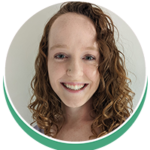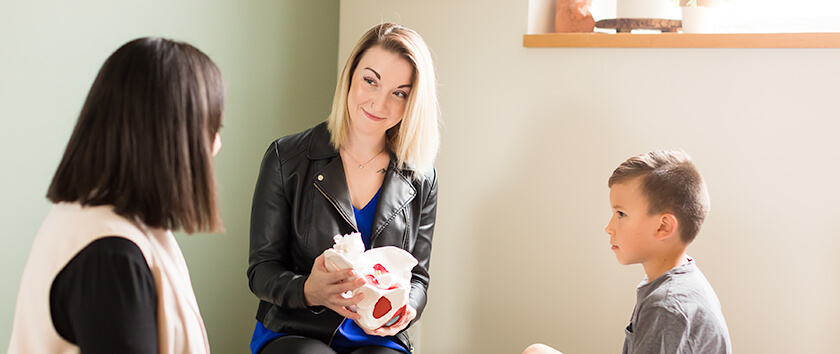
Pediatric Physiotherapy
At Pine Cone Health, we believe that children get the most out of their rehab when they are engaged, challenged and most importantly having fun!! Our Pediatric Physiotherapy strives to improve and enhance your child’s development and physical functioning through creative and engaging exercises, which may look like a lot of fun and play. Our therapists use their neurological, orthopaedic and developmental skills to help reach their functional goals. We believe in “family centered care” and that rehab continues in the home as well. We will work with parents and caregivers so they can continue doing rehab in their home to further help their child grow and reach their full potential.
Pediatric Physiotherapy Services We Provide
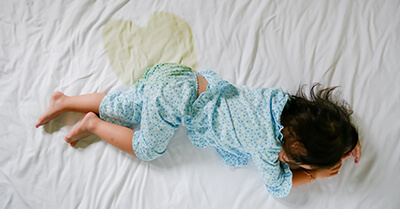
One of the great parenting challenges. This can be such a difficult issue for both children and parents and it’s more common than people might think. Our pediatric pelvic floor Physiotherapist will help to identify what is contributing to night time (or daytime) wetting. We will look at behavioural impacts such as bladder habits, hydration, digestion, and physical activity. Then we will also address any specific control issues that fall under the role of the pelvic floor muscles. There is no internal exam of children but learning how to strengthen, and relax, the pelvic floor muscles is an important part of curing bed wetting
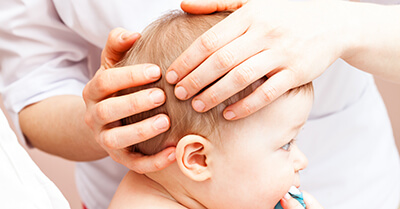
For infants who have torticollis/ and head shape (neck tightness and skull deformities) concerns, we will perform a comprehensive assessment and come up with a customized treatment program for your child.
This may include stretching and strengthening of weak and tight muscles, repositioning advice to help with skull deformity and ongoing follow up. With early intervention these conditions can be treated easily and effectively.
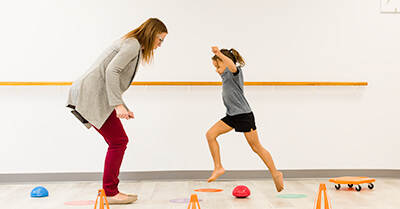
Are you a new mom and worried that your child isn’t rolling, sitting, crawling, walking or jumping yet? Do you have questions about your infant or child’s development? We are here to help. Through formal and informal assessments, and looking at how your child moves we can provide you with recommendations on things that you can do at home to prevent further delays and how to improve their skills in a fun and exciting manner. We also work with children who have a confirmed disability or condition to improve their development and participation.
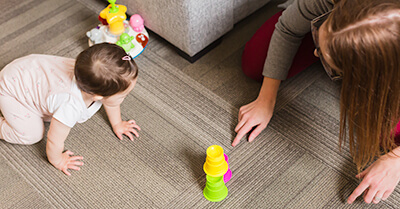
Precision movements of the hands, fingers, feet, toes are called fine motor skills. These are the skills that allow us to pick up small objects, use cutlery, write, play the piano, and do almost all of the tasks that we need to get done in a day! Fine motor skills develop from a strong core and stable base.
Our Physiotherapists will help to identify why your child might be having difficulty with precision tasks and make a plan to work on them. Treatment will consist of play based therapy in clinic, and recommendations for how you can support this skill development in your child at home.
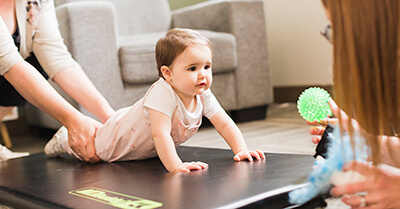
It is easier said than done!! We know how important tummy time is for a child’s development and preventing head shape concerns, but some babies just don’t like it. That’s where pediatric physiotherapy comes in. As physiotherapists, we can show you different ways of doing tummy time and find ways that work best for your baby. That way you can feel confident you are on the right track and go home with a toolbox of ideas to keep practicing.
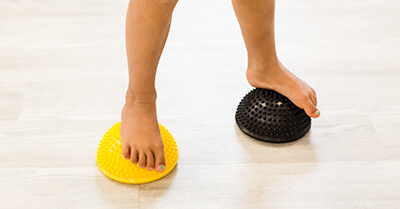
Toe walking is a pattern of walking on the balls of your feet without your heels touching the ground. In the absence of another medical condition we call this “idiopathic toe walking”. Walking on your toes can lead to a variety of issues. There are a variety of strategies we can provide to help curb this pattern before it gets even harder to correct. Early detection and correction is key.
Pediatric Physiotherapists
![]()
We are here to help you grow your health!
Some of the Struggles We Can Help Your Child or Teen With:
Bedwetting
Pelvic pain
Constipation
Gross Motor Delays
Fine Motor Delays
Global Developmental Delays
Juvenile Rheumatoid Arthritis
Positional Plagiocephaly
Brachycephaly
Toe Walking
Torticollis
In-toeing
Cerebral Palsy
Brain Injury
Down Syndrome
Autism Spectrum Disorder
Delays Resulting from Premature Birth
Other Neurological Conditions
Sports & Orthopaedic Injuries
How Do I Know if My Child Needs Physiotherapy Treatment?
How Do I Know if My Child Needs Physiotherapy?
A children’s physiotherapist can help your child reach the motor milestones detailed below, and ensure that they are moving in a way that best supports their physical development. The following chart provides information on milestones and warning signs to look for, broken down by your child’s age.
Motors Skill Milestones for Children from Birth to Age 6:
* Credit to pathways.org for the chart information
| Milestones | Warning Signs |
|---|---|
| While lying on tummy, pushes up on arms | Difficulty lifting head |
| While lying on tummy, lifts and holds head up | Stiff legs with little or no movement |
| Able to move fists from closed to open | Keeps hands fisted and lacks arm movement |
| Able to bring hands to mouth | Pushes back with head while lying on back |
| Moves legs and arms off of surface when excited |
| Milestones | Warning Signs |
|---|---|
| Uses hands to support self while sitting | Sits with a rounded backs |
| Rolls from back to tummy and tummy to back | Poor head control and unable to lift head |
| While standing with support, accepts entire weight with legs | Difficulty bringing arms forward to reach out |
| Reaches for nearby toys while on tummy | Arches back and stiffens legs when pulling to a sit |
| While lying on back, reaches both hands to play with feet | Holds arms back and has stiff legs in a supported stand |
| While lying on back, transfers a toy from one hand to the other |
| Milestones | Warning Signs |
|---|---|
| Sits without support | Uses one hand predominately |
| Sits and reaches for toys without falling | Rounded back when sitting, inability to straighten back |
| Moves from tummy or back into sitting | Poor use of arms in sitting |
| Starts to move with alternate leg and arm movement e.g. creeping, crawling | Difficulty crawling |
| Picks up head and pushes through elbows during Tummy Time | Uses only one side of the body to move |
| Turns head to visually track objects while sitting | Cannot take weight on legs |
| Shows more control while rolling and sitting | Does not transfer toys from one hand to the other |
| Picks up small objects with thumbs and fingers | |
| In simple play imitates others |
| Milestones | Warning Signs |
|---|---|
| Pulls to stand and cruises along furniture | Difficulty getting to stand because of stiff legs and pointed toes |
| Stands alone and takes several independent steps | Only uses arms to pull up to standing |
| Moves in and out of various positions to explore environment and get desired toys | Sits with weight to one side |
| Maintains balance in sitting when throwing objects | Strongly flexed or stiffly extended arms |
| Claps hands | Needs to use hands to maintain sitting position |
| Releases objects into a container with a large opening | Poor head control in upright position |
| Uses thumb and pointer finger to pick up tiny objects |
| Milestones | Warning Signs |
|---|---|
| Walks independently and seldom falls | Unable to take steps independently |
| Squats to pick up a toy | Poor standing balance, falls frequently |
| Stacks two objects or blocks | Walks on Toes |
| Doesn’t pull to stand | |
| Can’t crawl to climb stairs | |
| Doesn’t use pincer grasp (thumb and forefinger) to hold small objects |
| Milestones | |
|---|---|
| Is frequently moving in and out of various positions (e.g. crawling, climbing, cruising, and walking) to explore and get desirable objects | Coordinates movements needed to play and explore |
| Usually walks with heel toe pattern and not primarily on toes | Uses both hands equally to play with and explore toys |
| Enjoys and seeks out various ways to move and play | Has adequate endurance and strength to play with peers |
| Can maintain balance to catch ball or when gently bumped by peers | Is able to throw and attempt to catch ball without losing balance |
| Uses hands to help move from one position to another |
| Milestones | |
|---|---|
| Enjoys and seeks out various ways to move and play | Has adequate endurance and strength to play with peers |
| Uses hands to help move from one position to another | Coordinates movements needed to play and explore |
| Usually walks with heel toe pattern and not primarily on toes | Can maintain balance to catch ball or when gently bumped by peers |
| Is able to walk and maintain balance over uneven surfaces | Walks through a new room without bumping into objects and people |
| Is able to throw and attempt to catch ball without losing balance | Only leans on furniture, walls, or people and sits slumped over when tired |
| Coordinates both hands to play, such as swinging a bat or opening a container | Uses both hands equally to play and explore toys |
| Coordinates hand and fingers |
| Milestones | |
|---|---|
| Enjoys and seeks out various ways to move and play | Has adequate endurance and strength to play with peers |
| Coordinates movements needed to play and explore | Usually walks with heel toe pattern and not primarily on toes |
| Can maintain balance to catch ball or when gently bumped by peers | Is able to walk and maintain balance over uneven surfaces |
| Walks through new room without bumping into objects or people | Only leans on furniture, walls or people and sits slumped over when tired |
| Is able to throw and attempt to catch ball without losing balance | Coordinates both hands to play, such as swinging a bat or opening a container |
| Coordinates hand and finger movement needed to participate in table top games and activities | Is able to color and begin to imitate shapes |
| Is able to maintain good sitting posture needed to sit in chair | Uses appropriate force when playing with peers or pets or when holding objects |
If your child is not meeting several milestones or is demonstrating any of the warning signs, they may benefit from physiotherapy.
Meet the Pediatric Physiotherapy Team
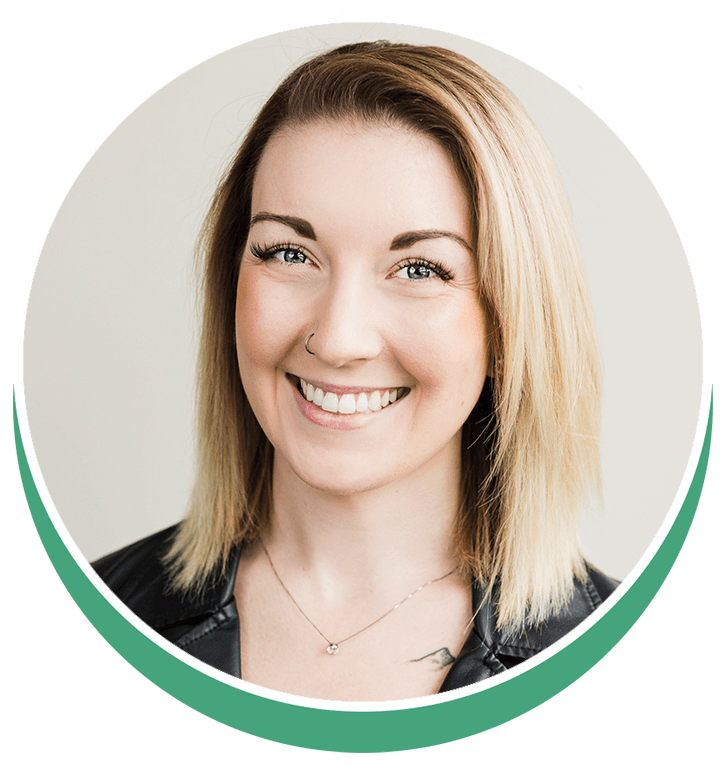
Calista Powell (she/her)
PhD, MScPT, BSc, PgCSH, ACC
PhD, MScPT, BSc, PgCSH, ACC
Licensed Physiotherapist – Edmonton Location
Pediatric Pelvic Health Physiotherapy
Treatment Populations:
- Pediatrics (3+)
Treatment Areas:
- Daytime Bladder Incontinence
- Nighttime Bladder Incontinence (Bed Wetting)
- Constipation
- Bowel Leakage (Fecal Incontinence)
- Imperforate Anus
- Hirschsprung’s Diseases
- Potty training difficulties
Post-Secondary Education:
- Doctorate of Philosophy in Clinical Sexology, International Institute of Clinical Sexology, 2022
- Master of Science in Physical Therapy, University of Alberta, 2017
- Post-baccalaureate Certificate in Sexual Health, University of Alberta, 2018
- Bachelor of Science, Ambrose University, 2015
Additional Training:
- The Evil Triplets of Female Pelvic Pain (& Their Friends…)
- Endometriosis 101: Moving Towards Better Care
- Special Considerations for Caesarean Section: Preparing for and Recovering from Belly Birth
- Spinning Babies Workshop
- Herman and Wallace: Pregnancy Rehabilitation
- Herman and Wallace: Postpartum Rehabilitation
- Herman and Wallace: Pediatric Incontinence
- Physical Therapy in Gender-Affirming Care: Transgender Health
- Hypopressive Training System Level 1 and 2
- Acupuncture Canada Certification
- The Female Athlete – Level 1
- CS1: Craniosacral Therapy 1, Upledger Institute
- VM1: Visceral Manipulation: Abdomen 1, The Barral Institute
- Pelvic Floor Rehabilitation: Pelvic Floor Physiotherapy for Paediatrics
- Pelvic Floor Rehabilitation: Physiotherapy for Ano-rectal Disorders
- Pelvic-Perineal Re-Education 2: The Physical Therapy Approach for Dyspareunia
- K-Tape for Women’s Health Certification
- Treating Urinary Incontinence: Pelvic Floor Muscle Re-education and Behavioural Techniques
Philosophy:
Cali dedicates herself to providing exceptional care to her patients. Through her own experiences Cali recognizes the importance of listening to patient’s concerns and experiences, ensuring they feel heard, understood, and validated. Cali uses a comprehensive approach to physiotherapy, providing well rounded, individualized treatment plans for each patient. She is committed to continuous education, constantly seeking out the latest research and knowledge ensuring that patients are receiving the most effective and evidence-based care. Cali focuses on utilizing education, manual therapy and exercise to help address the needs and goals of each patient. Her passion for what she does comes from witnessing her patients’ transformation and recovery and she strives to create a safe and supportive environment where they can embark on their healing journey with confidence and trust.
Fun Fact:
I became a mom in 2022, and I am more myself as a mom than I ever was before. However, I love what I do and knew I was going to be a physiotherapist on a trip to Thailand when I was 19. I also dream of writing a book.
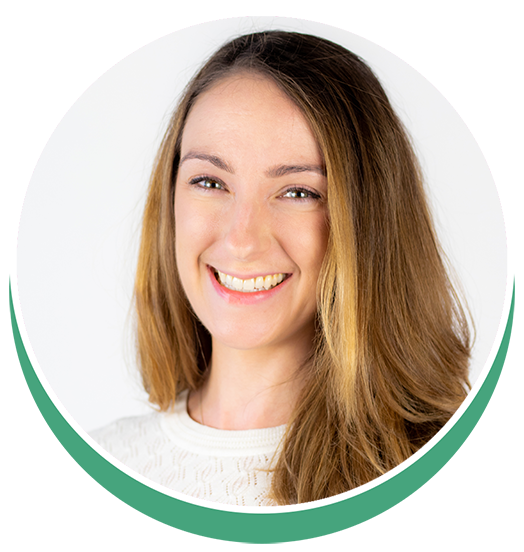
Simone Fleet (she/her)
MScPT, BScKin
Licensed Physiotherapist – Sherwood Park Location
Sherwood Park Clinical Lead
Pediatric Pelvic Health Physiotherapy
Treatment Populations:
- Pediatrics (3+)
Treatment Areas:
- Daytime Bladder Incontinence
- Nighttime Bladder Incontinence (bed wetting)
- Constipation
- Bowel Leakage (Fecal Incontinence)
- Imperforate Anus
- Hirschsprung’s Diseases
- Potty training difficulties
Post-Secondary Education:
- Master of Science in Physical Therapy, University of Alberta, 2013
- Bachelor of Science in Kinesiology, University of Alberta, 2010
Additional Training:
- Pediatrics Level 1-Treatment of Bladder and Bowel Disorders
- CS1: Craniosacral Therapy 1, Upledger Institute
- VM1: Visceral Manipulation: Abdomen 1, The Barral Institute
- Hypopressive Training System Level 1
- Cesarean Birth: The Role of Physiotherapy in Preparation & Recovery
- Pregnancy, Pelvic Girdle Pain & the Pelvic Floor
- Spinning Babies: Trainer Workshop
- Clinical Skills for Treating Pain using a Biopsychosocial Framework
- The Role of Physiotherapy in the treatment of Pelvic Pain
- The Physical Therapy Approach to Urinary Incontinence
- PWR!Moves Instructor- neurological rehabilitation training
Philosophy:
Physiotherapy is more than your physical health, it is utilizing movement -in various forms- to transform all facets of one’s health to function, participate in and enjoy one’s life. Simone strives to create an environment that is welcoming and safe where clients can be heard and validated as they navigate their concerns. Simone’s mission is to collaborate with her clients in finding the tools and strategies that will assist them in reaching their goals and have them leaving confident and in control of their own body. Simone is always honored to be a client’s coach and cheerleader as they navigate different seasons of life and the challenges that may bring.
Fun Fact:
I love plants and baked goods. One day I will work in a bakery within a greenhouse.
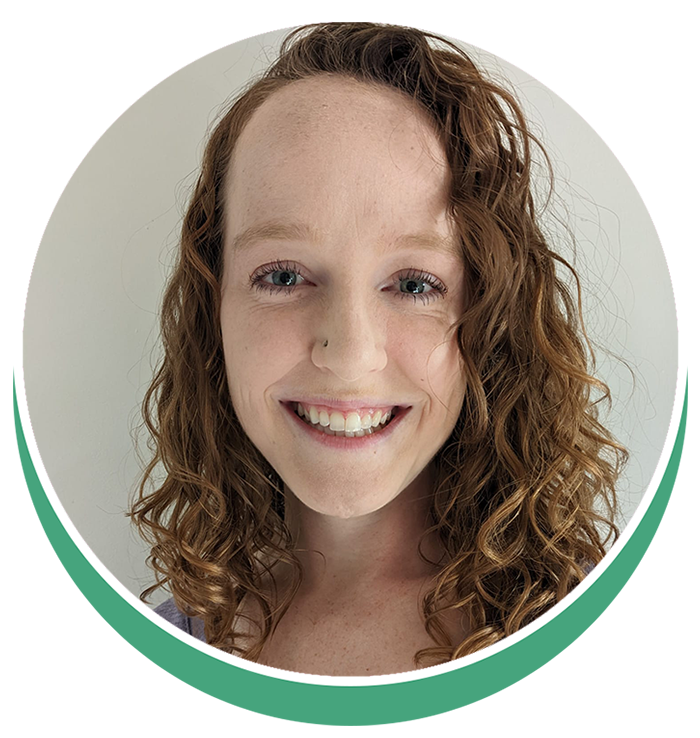
Allison Carnio (she/her)
MScPT, BScKin
Licensed Physiotherapist – Sherwood Park Location
Pediatric Musculoskeletal Physiotherapy
Treatment Populations:
- Infants (0-2)
Treatment Areas:
- Torticollis (CMT) and head shape (plagiocephaly, brachycephaly)
- Gross motor milestones (head control, tummy time, crawling, walking)
Post-Secondary Education:
- Master of Science in Physical Therapy, University of Alberta, 2018
- Bachelor of Science in Kinesiology, University of Alberta, 2016
Additional Training:
- Level 1: Physical Therapy Management of Urinary Incontinence
- Diploma of Advanced Orthopedic Manual and Manipulative Therapy: Level 2 Upper Quadrant
- 200 hr Trauma-Informed Yoga Teacher Training
- Clinical Update: Stress Urinary Incontinence and Pelvic Organ Prolapse Research and Management Review
- Level 2: Role of Physical Therapy in the Treatment of Pelvic Pain
- Level 3: Biopsychosocial Reframed
Philosophy:
Allison sees kiddos 0-2 years of age for concerns related to head shape and/or torticollis as well as for gross motor milestones. Allison loves working with these little ones because she finds it is often small changes that can make a major impact and there tends to be a change in a short amount of time. Allison assesses and treats by observing how babies and young kids move and then works on implementing changes through positioning and play to set them up for success as they grow! A session with Allison will typically involve discussion with caregiver(s), education, and play, followed by exercises/play positions to work on at home.
Fun Fact:
I am an identical twin! I also have fraternal twin daughters and a third girl who is 20 months older than the twins.

Ashley Rewers (she/her)
MScPT, BSc
Licensed Physiotherapist – Edmonton Location
Pediatric Musculoskeletal Physiotherapy
Treatment Populations:
- Youth/Teens (11-18)
- Pediatrics (2-11)
- Infants (0-2)
Treatment Areas:
- Torticollis (CMT) and head shape (plagiocephaly, brachycephaly)
- Developmental delay i.e. due to prematurity, early medical complexity etc.
- Gross motor milestones (head control, tummy time, crawling, walking)
- Gross motor development (balance, coordination, gait)
- Neuro-developmental concerns for conditions such as Cerebral Palsy, Autism Spectrum Disorder, Down syndrome, or seizure-related disorders
- Musculoskeletal injuries
- Skill acquisition
- Return to play / sport
- Master of Science in Physical Therapy, University of Alberta, 2024
- Bachelor of Science in Kinesiology, University of Lethbridge, 2022
- 240-hour Certified Hatha Yoga Instructor, Ajna Yoga, 2019
Additional Training:
- Neuro-relational Framework
- Brain Story Certificate
Philosophy:
Ashley’s practice is rooted in evidence-based methods with the goal of making movement both functional and enjoyable. At the heart of her practice is family centered care, where she collaborates closely with you to support the unique journey, values, and needs of both you and your little ones. Ashley strives to be a safe space for all ranges of abilities, including neurodiverse and LGBTQ2S+ folks! Her passions for working with children stems from using creativity to ensure that movement remains engaging and enjoyable. This means that sessions often include games or will look like play.
Fun Fact:
I was the captain of my rugby team in high school, who to this day, have taken home 12 of 14 Tier 1 Provincial Banners (the two losses were still in the championship game). Later on, I was coached by a Female Olympian who won gold and Sluggo, who coached at the Olympics, World Series, and World Cup level!
21
Team Members
2K+
Patients Treated
30
Kids Between Us
Get in Touch
Please fill out the form below and will get back to you.
[contact-form-7 id=”8″ /]




